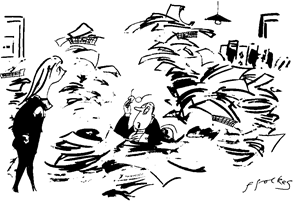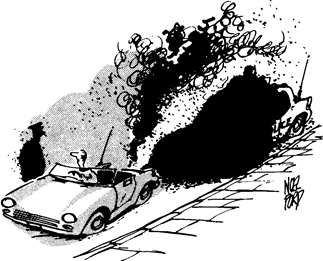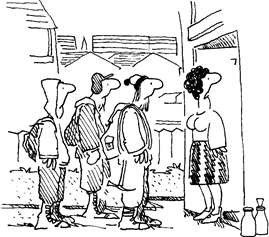All right, I suppose so
1 Complete the sentences with question tags.
(Sunday Express) 1. You,re not gom. g to m. vt.te h1. m, .... f. € ..,:. r··· I · J · O ··· U ··.. .... 7 8. Ann was away yesterday,......... 2. She's very late,.................. 3. He doesn't like pop music,.................. 4. The meeting's on Tuesday,.................. 5. You haven't got £5 on you,.................. 6. We'll have to hurry,.................. 7. You won't be late home tonight,.................. 9. She can't swim,.................. 10. You like Bach,.................. 11. Your mother isn't religious,...... 12. You'd like a drink,.................. 13. John wasn't at the party,.................. 14. You went to school in Scotland,.................. 15. Mary doesn't know I'm here,..................
2 What do these road signs tell you to do or not to do? Examples:
Sign B tells you not to park. B c D(l) Fe;G® Htl) [9 J
3 Some of these words are stressed on the first syllable (like carpet), and some are stressed on the second syllable (like invite). Divide them into two groups, according to the stress, and then practise pronouncing them. Use a dictionary to help you if necessary.
about afraid afterwards already carpet difference directions everybody exactly forget happen mvite language manager promise remember repair restaurant secretary silence somebody suppose
afraid been trying been waiting by for goes have to have to if me to month must must to urgent us to won't you to
R L: Er, Miss Collins. ISS c: Yes, Mr Lewis? R L: I'd like........L..... do a couple of letters for me,........2........ you don't mind. MISS c: Well, er, Mr Martin has just asked .........?......... do a letter for him. He says I.t's........4........... MR L: Well, I'm.......J......... he'll........R........ wait. I've ........?........ to get these letters written all week, and they ................. go today. I ......... 'L..... keep you long. MISS c: Right, Mr Lewis. MR L: This letter is......JQ....... John Barlow, at Barlow and Fletcher, in Manchester.
'Dear Mr Barlow
Thank you for your letter of April 14, in which you ask.......U....... wait a further six weeks for delivery of our order. Iam afraid that this is out of the question. We have already......J.f...... eight weeks .......U....... these urgently needed parts, and we.......H...... have them by the end of the........U....... If they do not arrive.......U>....... April 30, I regret to say that we shall.......l?...... cancel the order and look elsewhere.
Yours sincerely
Paul Lewis.'
See that this...... H....... today, Miss Collins, would you? MISS c: Yes, of course, Mr Lewis. MR L: And now a letter to...
"I must warn you, Miss Pringle, there's an awful lot of paperwork."; 5 If you have Student's Cassette B, find Lesson 33, Exercise 1. Listen and imitate the pronunciation. Pay special attention to intonation (the musical rise and fall of the voice).
6 Read this with a dictionary. Can you write some misleading advice for foreign visitors to your country?
Misleading advice for foreigners
[The New Statesman magazine set a competition in which readers were asked to give misleading advice to tourists visiting England for the first time. These are some of the entries.)
Women are not allowed upstairs on buses; if you see a woman there, ask her politely to descend. Visitors in London hotels are expected by the management to hang the bedlinen out of the windows to air. Try the famous echo in the British Museum Reading Room. On first entering an underground train, it is customary to shake hands with every passenger. If you take a taxi, the driver will be only too willing to give your shoes a polish while waiting at the traffic-lights. Never attempt to tip a taxi-driver. Public conveniences are few; unfrequented streets where relief is permitted are marked 'P'. Parking is permitted in the grounds of Buckingham Palace on payment of a small fee to the sentry. Never pay the price demanded for a newspaper; good-natured haggling is customary.
public conveniences: public lavatories unfrequented: deserted sentry: soldier on guard haggling: arguing about the price
"Remember me from last night?";
1 Write a past conditional sentence for each situation. 1. Yesterday began as a terrible day for Chris. He didn't hear the alarm clock, so he got up late. If.he..h9.d..hew.d...i;he..A.lQ.f.m...,..h....\I))P.. l4.. ho..N.e.. H -- ·········· 9...:l::..i.m...........................................................................................................······················........ 2. He usually reads the paper in the morning, but he didn't yesterday. H.e.... 9.. l4...he..r...the...p.o..p.er...i....he...h. t:...go.t<...!Jf....loie......
3. He was really late, so he decided to drive instead of taking the bus. 4. He was worried about being late, and he didn't close the house door properly. 5. He saw it was open, and got out of the car to close it. 6. In his hurry, he locked the car with the keys inside. 7. He ran back into the house to get the other car keys, and knocked a jar of jam all over the kitchen. 8. The main road to his office was closed for repairs - it had been in the paper that morning, but he hadn't read the paper. 9. When he finally got to work, he was really late, and there were no more places in his office car park. 10. He spent twenty minutes looking for a parking place. He should have taken the bus! 11. His boss thought he was ill and gave some of his work to his colleague Janice. 12. When he walked into the office, the boss gave him a new project, working with a firm of architects. 13. He was surprised to find out that the receptionist at the architects' was an old school friend that he hadn't seen for years; he was delighted that the boss hadn't given the job to someone else. 14. The boss said she had meant to give the project to Janice, but gave it to Chris because Janice had already started on his old project. 3 The woman's arm wouldn't have been burnt if the car hadn't crashed. Make some more sentences about what wouldn't have happened.
4 Pronunciation. Say these sentences with the right stress.
1. If she'd been bad at languages, she would have studied maths. 2. She'd have become a teacher if she'd studied maths. 3. If she hadn't decided to become an interpreter, she'd have gone to teacher training college. 4. If she'd gone to teacher training college, she would have met Alice there. 5. She wouldn't have met Andrew if she'd gone to teacher training college. 6. If she hadn't met Andrew, she wouldn't have gone to Crete.
2 Put a word from the box into each blank in the text. You can use your dictionary.
adopt local animal angry lost love oil arm car phoned fish police fish put injured turn
A West German woman's.......J......... for cats has brought her an........+......... cat and a bill for £23,000. The story, told by German........L......, began when the 56-year-old woman from Wuppertal.......4......... her cat and.........>......... an advertisement in the........9......... paper. A man........?........ her to say he had found the .............., but in fact it was not hers. However, she felt sorry for the cat, which must have been a stray, and decided to.......::!......... it. On the way home in her Mercedes.......W......, the cat 'suddenly went wild' and bit and scratched her ......J:L...... This caused the car to.......1:?....... off the road and crash into a parked car, bringing down a sausage stand and a neighbouring.......L3........ and chip stand. Boiling.......H....... burnt the arms of a 44-year-old woman selling......U....... and chips, and a 21-year-old woman who was waiting for her chips fainted and .......Vi....... herself falling to the pavement.
(adapted from an article by Anna Tomforde in the Guardian)
\
1;. 3 ·,:_ /,''
-
!
. 16
6 Write the story of your life in 100 words or so. Then write four sentences about it using 'If... had(n't)...,... '
1 You can go to a travel agent's to make enquiries about a holiday, to buy an air ticket to New York, because you want to make a reservation on a train, and for lots of other reasons. You can go to a petrol station to buy petrol, to have the oil checked, because the petrol pump attendant is a friend of yours, etc. Why did you last go to the following places (answer with To... or Because...):
a petrol station; a travel agent's; an airport; a bus stop; a garage; a station enquiry office; a police station; a post office; a bank.
2 Put in the right 'question tags'. 1. It's a nice day, i r.{t...:....?... 2. You look very like your father,.................. 3. You aren't tired,.................. 4. Mary doesn't drink wine,.................. 5. Your mother speaks Chinese,.................. 6. The garden's looking nice,.................. 7. People are all different,.................. 8. You've got a cold,.................. 9. He doesn't drive very well,.................. 10. You want to speak to the manager,..................
3 Put in anybody, somebody, nobody, everybody, anything, something, nothing or everything.
1. I think there's.................. at the door. 2. I'm sorry - I haven't got.................. for you to drink. 3. I think you know.................. who's here, don't you? 4...................'s worrying me - can I talk to you about it? 5................... really knows what goes on inside children's heads. 6. Has.................. seen Janet today? 7. She had her bag stolen in London: she lost her passport, her money, her air ticket -................... 8. 'Would you like a sandwich?' 'No,.................. to eat, thank you.'
4 If you have Student's Cassette B, find Lesson 35, Exercise 2. Choose three or more of the pieces of conversation and try to write down the words.
«What about my exhaust, officer?"; 5 Imagine you are standing outside the main post office in a city or town in your country. Somebody asks you the way to a bank, or a railway station, or a museum, or somewhere else (you decide exactly where). Write what you will say to him or her.
6 Strange but true! Read this with a dictionary. The scientist Thomas Young could read when he was two years old, and had read the Bible twice when he was four. He learnt twelve languages as a child, and could play a large number of musical instruments. By the age of thirteen, the French linguist Champollion had learnt Latin, Greek, Hebrew, Arabic, Syrian, Chaldean and Coptic. When he was 21 he solved the mystery of ancient Egyptian hieroglyphic writing. Sir John Bowring (1792-1872) was said to be able to read 200 languages and speak 100. The New Zealander Dr Harold Whitmore Williams could communicate in 52 languages, and was fluent in 28. 500 years ago Leonardo de Vinci produced designs for a parachute, a life jacket, a water pump, a paddle boat, a steam gun, a lens-grinding machine, a machine gun, a helicopter, a submarine, and a number of other modern inventions. He was also one of the greatest artists that has ever lived. The American chess master Morphy once played eight games of chess simultaneously while blindfolded. (He won six of the games.)
«George, is there a mountain near here?";
1 Look at the picture. Where are things? Where should they be? Example:
There's a chair on the piano. It should be on the floor.
4 Vocabulary revision and extension. Match the words and the numbers. carpet ceiling cupboard door floor
out out of to down up for on off garden gate light roof shelf sink tap wall washbasin window
1. Look.................. my new shoes! 2. I've lost my keys. Can you help me look.................. them? 3. It's getting dark. Shall I switch.................. the light? 4. Would you like to take.................. your coat and sit..................? 5. Let's listen.................. some music. 6. Could you pick.................. the children's shoes and put them..................? 7. This meat's bad. I'll have to take it................... 8. Tell Ann to put.................. her coat before she goes
9. 'What's the weather like?' 'Why don't you 10. look.................. the window?' 'Here's your shopping.' 'Thanks - just put it .................. over there.'
\,_ 11
3 Complete the table.
WHO? I you he she
WHO(M)? me
him
WHOSE? my
WHOSE? mme myself ;,,-A.Ir/10 it we you they its itself
5 Practise saying these words with the correct stress. afterwards along careful crossroads everybody exactly finally forget handbag invite manager midnight
6 Imagine an English friend is coming to visit you in your home. Write a letter, giving precise instructions on how to drive to your home from the main road into your city/town/village.
|



 4 Complete the dialogue with the words and expressions from the box.
4 Complete the dialogue with the words and expressions from the box.





 34 If he had been bad at maths,• • •
34 If he had been bad at maths,• • •
 Expensive kindness
Expensive kindness




 .
. ' '
' ' ..-·,.::.
..-·,.::. I
I 35 Travel
35 Travel 71
71



 at away back
at away back

 , 73
, 73


